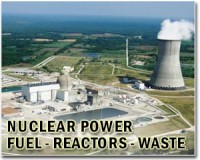 |
Santiago (AFP) March 15, 2011 As a potential nuclear disaster unfolds in Japan, quake-prone Chile is thinking twice about atomic power as a solution to its pressing energy needs. "Until Japan's earthquake I was a supporter of nuclear energy. Now I have my doubts," said Senator Jaime Orpis, a member of the Democratic Independent Union (UDI), a party in President Sebastian Pinera's governing coalition. Chile, like Japan, has a history of powerful earthquakes and destructive tsunamis. Just a year ago in February, an 8.8 magnitude quake, followed by a tsunami, killed more than 500 people here. Unlike Japan, Chile has only two small research reactors, but the Pinera government has been actively exploring nuclear power as an alternative source of power. A fuel importer, Chile faces rising demand for energy, driven in part by a boom in its cooper industry. It currently relies on hydroelectric and coal or oil-fueled power plants to generate the power that rapidly growing economy requires. Energy Minister Laurence Golborne was recently in France, where he toured a nuclear power plant and signed an agreement to train Chilean nuclear technicians. Chilean and US officials will sign a similar agreement on Friday, just days before US President Barack Obama visits the country. But the crisis in Japan has dramatically shown the risk of an energy strategy based on nuclear power in a country with Chile's unstable geology. "We are opposed to the development of nuclear energy ... particularly in Chile, where there is a high level of seismic activity," said Samuel Leiva. Greenpeace's coordinator in Chile. Golborne, a former mining minister, said Tuesday that Chile does not currently have a nuclear energy plan. "There is no plan to establish nuclear power plants, there are no potential nuclear power plants in Chile -- therefore, let's put the magnitude of this debate in proper context," he said. Golborne, however, said that Chile must have a long-term view concerning energy, "and that means considering all available sources of energy," including solar, wind, and nuclear. Juan Lobos, another UDI legislator, said the Japanese experience "should be analyzed so that we do not commit the same mistakes. "But in no way does this justify that the country renounce developing nuclear energy in the short term," he said.
Share This Article With Planet Earth
Related Links Nuclear Power News - Nuclear Science, Nuclear Technology Powering The World in the 21st Century at Energy-Daily.com
 Fresh fire at Japan nuclear reactor: operator
Fresh fire at Japan nuclear reactor: operatorTokyo (AFP) March 16, 2011 A fresh fire broke out at a reactor of Japan's quake-hit Fukushima No. 1 nuclear power plant early Wednesday, operator Tokyo Electric Power (TEPCO) said. An employee confirmed smoke was pouring from the roof of the number-four reactor at the plant, a TEPCO spokesman told reporters. "We immediately informed local authorities and the fire department about it," the spokesman said. "We are b ... read more |
|
| The content herein, unless otherwise known to be public domain, are Copyright 1995-2010 - SpaceDaily. AFP and UPI Wire Stories are copyright Agence France-Presse and United Press International. ESA Portal Reports are copyright European Space Agency. All NASA sourced material is public domain. Additional copyrights may apply in whole or part to other bona fide parties. Advertising does not imply endorsement,agreement or approval of any opinions, statements or information provided by SpaceDaily on any Web page published or hosted by SpaceDaily. Privacy Statement |